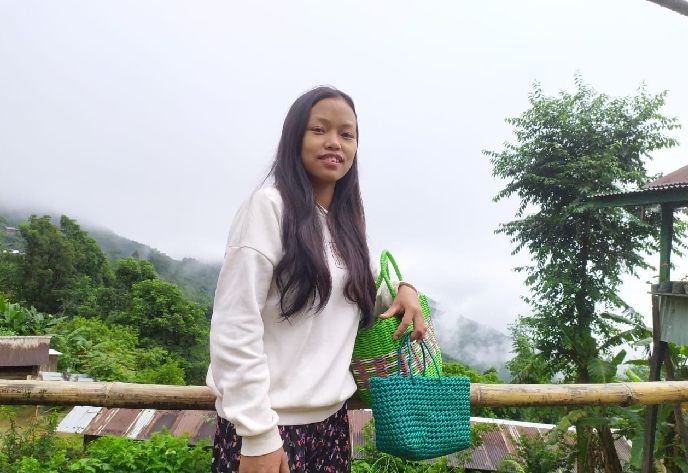Vivekali A Awomi, a BA student, who started learning basket-making from YouTube tutorials during the lockdown period.

Kanili Kiho
Chisholimi | September 3
With the enforcement of nationwide lockdowns to curb the global pandemic earlier this year, both the government as well as the public is facing several challenges, particularly in the economic front.
Many students, however, are creatively spending their ‘more than usual time on hand’, and turning the ongoing crisis into an opportunity by picking up new hobbies and habits.
Such creativity is enabling them to create economic opportunities as lockdowns disrupted their ‘formal education.’
In doing so, there seems to be realization that dependency on government is not the only way out.
Take the case of Vinotoli V Chishi, who gave up a networking business she joined last year as she lost most of her customers because of the lockdown.
However, in July, she received a call from her business ‘upline,’ motivating her “to focus more on your business.”
After a month, Chishi is now a Manager at Oriflame (Beauty and Wellness Company) and earns at least 10k a month, apart from other incentives.
With more time in her hands, the postgraduate from Maromi village under VK area, who is now taking up B. Ed (Bachelor’s Degree of Education) was able to go digital and widen her network.
Clearly happy, Chishi said she is helping her parents by not asking for ‘pocket money.’
“We cannot keep waiting on the government. We Nagas generally tend to dream of ‘that big thing’ to happen instead of doing what we can with what we have,” Chishi shared.
“No matter how small we may think it is, if we are honest in what we do, big things will automatically come our way,” she added.
For Vivekali A Awomi, state government enforced the lockdown gives her an opening to learn basket-making from YouTube tutorials.
Awomi, a native of Khetoi village, is reinvesting her small earnings towards a networking enterprise that joined recently. She is a BA (Bachelor’s degree of Arts) student from Kohima.
Another creative duo- Piyetoli and Livina Yepthomi cleared the dust from their shelf of ideas and decided to take their love for do-it-yourself crafts to the next level.
They created ‘Artsy Craftsy,’ a DIY project, and began creating resin coasters, cheeseboards, keychains, wooden fridge magnets and decoupage.
The siblings started their business in mid-April and have since been receiving orders from all over the state, working from home in Zunheboto.
Once things get back to ‘normal,’ the sisters hope to go back to Bangalore and continue their studies.
“At the same time, we want to keep our @artsy_craftsy___ account active,” they said.
Instead of staying idle at home, Nagabo Sheqi from Natsumi village took up tutoring high school students in his villages at the start of the lockdown.
For the last four months, the civil engineering graduate is engaged with the new challenge.
The pandemic woes as well as the lack of proper internet services that hamper online classes spurred Sheqi to take the responsibility of tutoring young minds despite limited resources.
COVID-19 has upended most aspects of daily life and much of the economy built around it. However, stories like these students from Zunheboto district as well as several others from across the State are reminders that Nagaland has ample resources—human and material, to transit into a self-sufficient economy.






